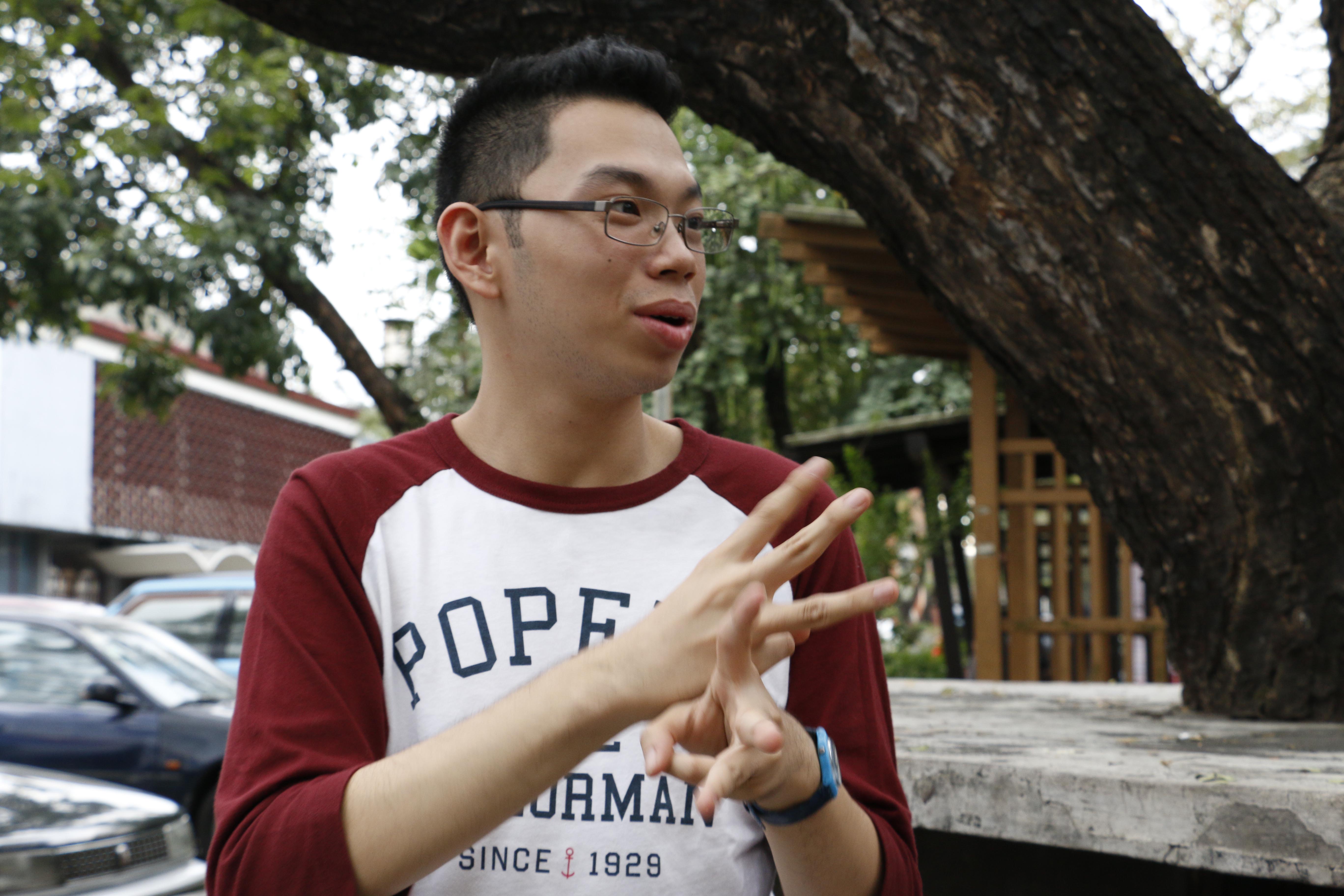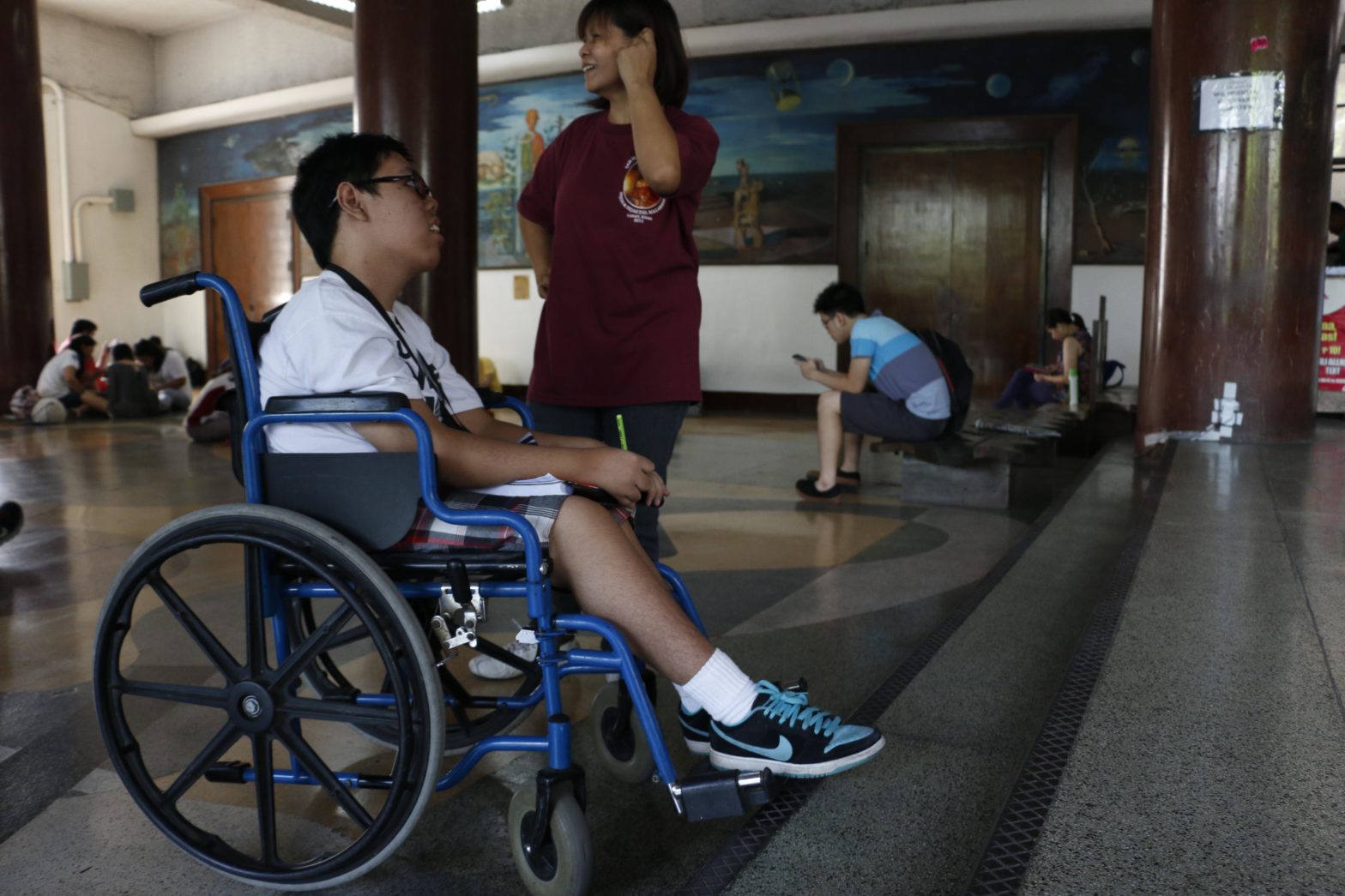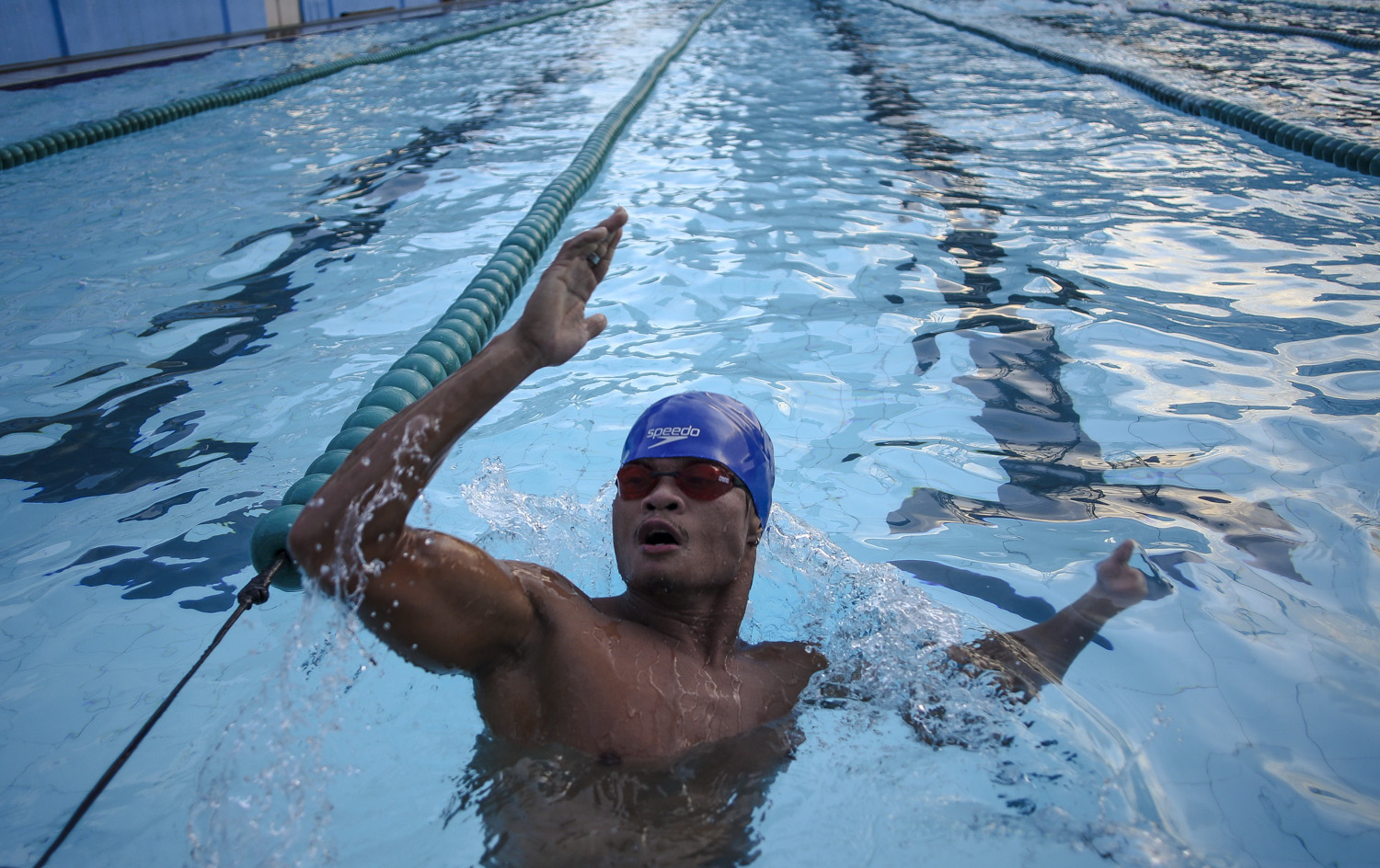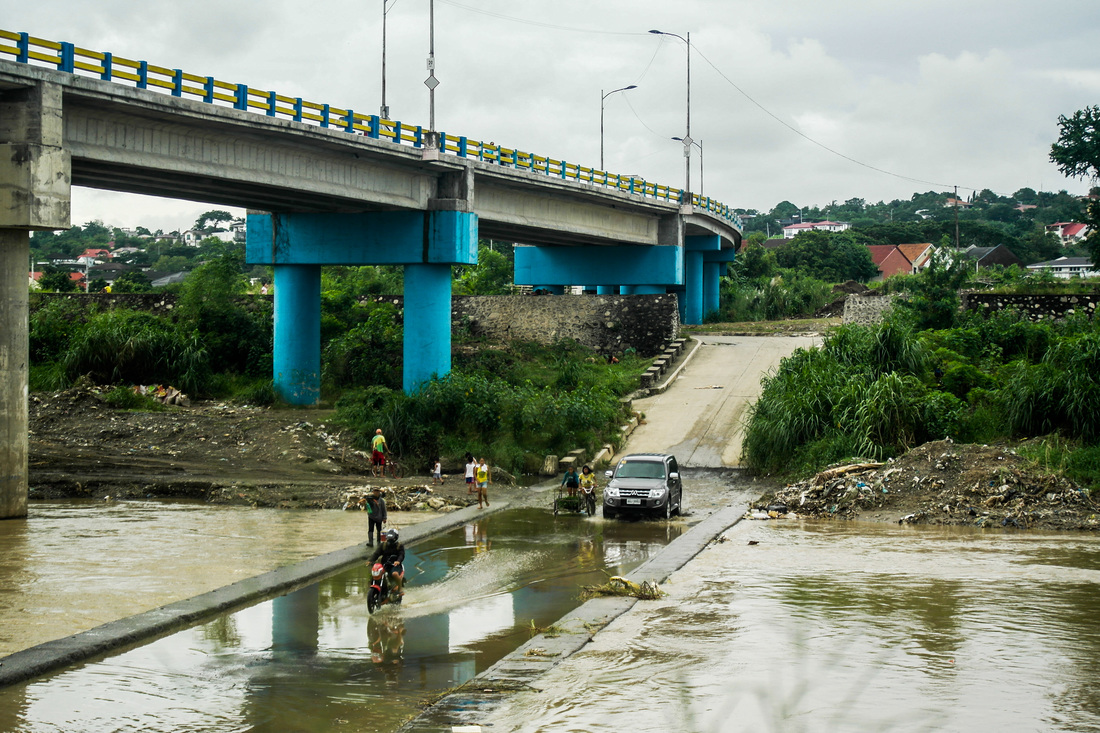
By JHESSET THRINA O. ENANO
WITH a notebook in hand, Caldwell Jones Reynaldo sits near the entrance of a college library at the University of the Philippines Diliman. Its pages are filled with his scribbled thoughts, alongside conversations with his classmates and friends.
His Facebook page, meanwhile, is filled with his art. His profile picture is his portrait in watercolor: rectangular eyeglasses, hair gelled up, a toothy grin.
Reynaldo, whom his family calls CJ, wants to be an artist. Deciding that the UP College of Fine Arts would be the best place to hone his talent, he enrolled in its visual communication program.
On the 493-hectare campus, Reynaldo—now in his second year—sometimes cannot help but feel lost, not only between classes and buildings, but also as part of a large minority, both in the university and in the world.
Born with hearing impairment, this is his first time to be mainstreamed in a regular school, having studied before at the Miriam College-Southeast Asian Institute for the Deaf. The adjustment for him does not come easy. UP Diliman, the national university’s biggest constituent unit, lacks a clear policy on reasonable accommodation and services for persons with disabilities (PWDs) like him. It is a sad commentary on UP’s failure to provide the mandated inclusive education as the country and the rest of the world mark the International Day of Persons with Disability on Dec. 3.
Special UPCAT
In 2008, the Special UP College Admission Test (UPCAT) was formalized, improving opportunities for PWDs to take the qualifying exam. The entire admission process, however, is done at the system level. Beyond that, UP’s eight constituents all over the country are left to decide the fate of students with disabilities who qualify in their respective campuses. (See “UP’s special admission test for PWDs“)
Until early April this year, UP was not even on the list of college and universities in Metro Manila that accept PWDs after it failed to reply to a 2013 survey conducted by the National Council on Disability Affairs, the government agency that oversees disability issues and concerns in the country.
The survey sought to find out the types of assistance colleges and universities extend to PWDs—facilities, technologies and scholarships—and provide students with disabilities information that would help them decide where to enrol after graduating from high school.
The national university finally replied to the NCDA two years later. UP President Alfredo Pascual, who signed the letter, said his office “inadvertently overlooked” the survey form sent two years ago.
His letter shows the accommodations it extends to PWDs were primarily assistance given during the Special UPCAT.
No office or focal person for PWDs
In Diliman, the lack of policy translates to the absence of a designated office or people to address PWD concerns. As a result, Reynaldo and other students with disabilities are left to assume that there are no accommodations to be extended to them.
“There is not one office that addresses their needs,” said Dr. Therese Bustos of the UP Special Education Area. “At least there should be somebody from each of these offices (in Diliman) that should be able to handle their concerns.”
The Magna Carta for PWDs, passed in March 1992, clearly states that necessary special facilities for PWDs in state universities and colleges should be provided and funded by the national government.
Differing needs
PWDs have differing needs. To determine the necessary accommodations for them, their presence in the university must first be determined. The Computerized Registration System utilized by UP Diliman provides this function, where students can self-disclose their condition when filling out the Student Profile form. This function is similar to the tick box in the Special UPCAT form.
However, interviews for this study showed it is unclear how this information is being handled, and whether the data is given to colleges with PWDs enrolled in their programs.
In his classes, communication is a challenge for Reynaldo, who requires a sign language interpreter.
He finds his major subjects in Fine Arts easier than his general education subjects, like math and social sciences, which require a lot of reading and writing. To keep up, his interpreter has to attend all his classes with him.
Sign language interpretation is a costly service. Last year, Reynaldo’s interpreter services cost around P35,000 per month, bigger than his tuition. To cut costs, his mother Jane decided to leave her job as a travel agent to be his interpreter instead.
“It’s not just interpreting the lessons or discussions, but you make it a point that CJ can process it also,” Mrs. Reynaldo said. “Sometimes, I myself cannot understand the lecture; that’s why it’s difficult.”
With their medical conditions, students with special needs spend more for their university education compared to other students. Republic Act 9442, which amended the Magna Carta, stipulated that qualified students with disabilities are entitled to educational assistance, which can come in form of scholarships, grants, and aids, including support for feasible resources and learning materials.
However, the Socialized Tuition System employed by UP Diliman does not account for medical conditions of students. There is no item in the application form, which is accomplished online, that would allow students to disclose their disability, according to the Office of Scholarships and Student Services.
No special learning materials
UP Diliman also does not provide special materials to aid learning. For Eileen Galang, a blind student studying classical voice and piano at the College of Music (CMu), it translates to bigger costs for her education.
While her tuition is less than P20,000 per semester, she has to shell out more money to get materials translated to Braille at the Resources for the Blind Inc., a nongovernmental organization providing services to blind people across the country.
Since 1989, the college has graduated three blind students. One of them is Raymond Gatdula, Galang’s professor in Braille music notation. He was recently hired by the college to teach a new class for students with visual impairment.
Developed last year, the “Music Theory for the Visually Impaired” class was the college’s response to the growing number of blind students applying and qualifying in their programs. The challenge, however, arises from the lack of materials for students who are blind or with low vision. To compensate, Gatdula lends his personal materials to Galang to reproduce and study.
CMu dean Dr. Jose Buenconsejo said the college library is not equipped for students with visual impairment. Not a single textbook or material is in Braille or large print.
“We just put in the effort,” Galang said. “The faculty also usually makes way for adjustments.”
Interviews with pertinent officials in the campus, such as those from the Office of Guidance and Counseling, College of Education and Diliman Resource Learning Center, showed that UP does not have any assistive technologies for any types of disabilities, such as Braille printers and display and closed captioning in audiovisual materials.
Faculty’s role
In the absence of policy and materials, faculty members play significant roles in accommodating students with special needs in their classrooms.
The Office of the Director of Instruction addresses the design and implementation of academic programs and policies. To address PWD concerns, the office, then under the leadership of Prof. Portia Padilla, added a session on Universal Design of Learning in 2011 to the Teaching Effective Courses and University Training seminars. The added session focused on inclusive education, which gives equal opportunity for participation to all students of different backgrounds and capabilities.
More than 200 UPD students declared they had a type of disability in 2012, Padilla said.
Both the colleges of Music and Fine Arts have PWD alumni who all survived in their own terms, sans reasonable accommodation from the university. Both colleges continue to have students with disabilities enrolled in their programs.
However, the deans of the two colleges admitted that their units are not fully equipped with necessary facilities and materials. They also said their faculty members are not prepared to handle students with disabilities.
Prof. Leonardo Rosete, dean of Fine Arts, said the faculty should be more flexible in teaching PWDs, without lowering or changing the standards to be met.
“The faculty members must realize PWDs may be instructed in a different way,” he said. “We have been coping, but there is more to do.”
Space for PWDs
Former Vice Chancellor for Academic Affairs Dr. Ronald Banzon sees budget as a primary concern. He also said the College of Education, particularly the Special Education Area, should take a bigger role.
“I’d like to see a more extensive College of Education,” he said. “The best way is to have (an office) assigned to the College of Education, the best unit to define the requirements.
In 2011, Banzon’s first year in office, Dr. Leticia Ho, then dean of the College of Education, approached him about a proposal for a space for gifted students, including PWDs, in the campus. Banzon said the matter was brought up to then Chancellor Caesar Saloma, who decided that the best way to approach the issue is for the request to be made through the college.
Ho, now retired from the academe and heads the Philippine Center for Gifted Education, said in a phone interview the proposal was a four-story building to serve as a space for twice-gifted youth and those with disabilities.
The building would have included office spaces, residential areas and a library. Funding would have come from a private donor, whom Ho declined to identify.
“It could have institutionalized the program,” she said.
But she added, “No one talked to me again.”
Because of this, Ho said the donor decided to withdraw the money just this year.
Community support
The lack of institutional support drives students with disabilities to thrive on another support system, even if it comes on a personal basis: the Diliman community.
In an environment that limits mobility, Alexander Michael Bautista—a business sophomore student with mobility impairment—relies heavily on utility people, security guards, and even photocopier staff to carry him up and down staircases on his wheelchair, just to get to his classes. This has been his way of coping since most buildings in the campus do not have elevators or ramps.
“It’s difficult and a little embarrassing because it’s a hassle,” he said. “I also want to be independent, even just a little.”
Similar to Reynaldo, Galang and Bautista are also accompanied by their parents to UP everyday, assisting them in their needs in and out of the classroom.
Batas Pambansa 344, or the Accessibility Law, mandates that public areas, including government buildings and educational institutions, are accessible through different structural features. These facilities include ramps, railings and designated parking spots of PWDs.
An accessibility audit conducted on 20 buildings in UP Diliman for this study showed that many do not comply with the law, lacking features necessary for access to public areas necessary to student life.
What can be done
Rosete said the best way to discuss disability concerns would be at the university level.
“This is not seriously looked at, a blind sight,” he said. “If the university would take inclusive teaching to be part of agenda, there must be a pool of resources that units can tap.”
Bustos said coordination with pertinent people and offices for a solid program on disability affairs is necessary.
“Having (a disability affairs) office may not be the answer,” she said. “There must be a better way to address disability, and I think it can be addressed at (the) college level.”
(This report is culled from the undergraduate thesis, “Padayon U.P. para sa P.W.D.: An Investigative Study on the Admission and Accessibility of the University of the Philippines Diliman for Persons with Disabilities,” which was adjudged as this year’s best journalism thesis by the UP College of Mass Communication. The study also won the first prize for the Chit Estella Journalism Research Awards for Investigative Journalism during the Philippine Journalism Research Conference in March. VERA Files trustee Yvonne Chua was the thesis adviser.)



